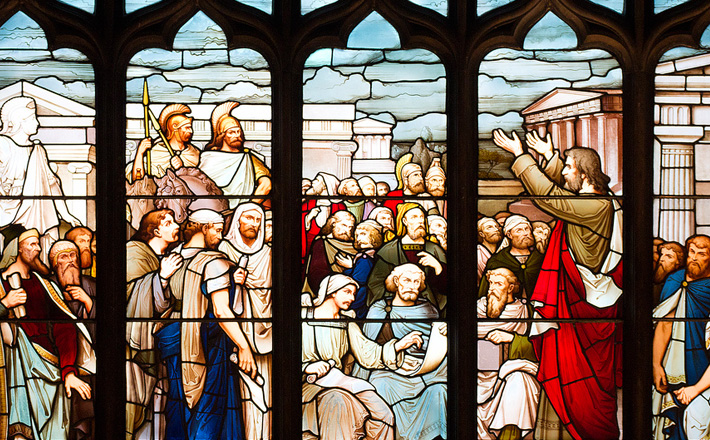Commentary on John 14:15-21
For many years, tradition and biblical studies held that the Gospel of John was understood to be the “Spiritual” Gospel.
This generally meant two things: it did not provide historical content (i.e., not much historical value), and was simply ahistorical/spiritual in nature rather than being contextually relevant. Liberals/progressive pastoralists, theologians, and eventually, liberationists, tended to ignore John’s Gospel in favor of the more “historical” gospels. The implication was that esoteric ideas were not very useful in addressing then-present day challenges. Interestingly for conservatives, John’s Gospel became a favorite. It offered “eternal” truths that fortified traditional theological tenets — especially John, 14:6 — “Jesus saith unto him, ‘I am the way, and the truth, and the life: no one cometh unto the Father, but by me.’”
These initial views of Johannine literature and the scholarship of the Gospel began to take a shift in thought. It began to view the Johannine corpus as a literary genre intended not for historical purposes, but perhaps intended to be purposefully ideological and contextual (i.e., responding to very specific needs). Although the synoptic gospels all do this, John’s Gospel engages in contextualizing to a much greater degree.
In other words, we can assume that the redactor of the Gospel of John did a more extensive re-reading of the Jesus story so that he or she could respond to his or her contextual reality. I would therefore suggest to the preacher that this provides an opportunity for creativity within our sermons, in contextualizing them for our congregations. The Johannine literature gives us an opportunity to be creative and interpret Jesus’ story for the 21st century. This allows the Gospel to be more relevant to us today, in our daily lives.
This Gospel passage speaks to a very human reality: the fear we feel when we lose a loved one who played an important role in our lives. Those of us who have had such an experience know that we can become shaken and concerned about the future. It is easy to think, “How should I proceed when a strong personality in my family passes on?”
How can we live up to the example of our mothers, fathers and mentors? Who can replace Pope John Paul II, Martin Luther King Jr., Gandhi, Mother Teresa, Dorothy Day, etc.? I can imagine the disciples probably asked themselves similar questions: “How can we keep The Commandments, our faith, and continue our struggle without the guidance of Jesus?
Knowing the challenges and persecution that the nascent church experienced, we can envision how significant Jesus’s words of assurance would have been to his disciples. It can be argued that the church today is traversing some uncertain and challenging times, and the Gospel of John is certainly a reminder that we are not alone. This lesson can be equally assuring now as it was then; to know that even today we are never abandoned by Jesus.
African Christian theologians have a great penchant for this passage because it has an affinity with traditional beliefs in African and Caribbean spiritual ancestor worship, such as the belief that our departed ancestors move on to higher levels of living, knowledge and wisdom, and henceforth are always there to guide us. These theologians see in this passage, Jesus coming back to guide his disciples through the Holy Spirit of truth. This truth continues to guide them and us, advocating for all of us. It can be said that the ancestors for people of African descent return in a superior state and with more power; likewise, the Spirit “takes over” for Jesus.
Jesus returns with limitless power via the Holy Spirit. The limitations of the embodiment of Jesus are no longer an impediment, because as can be seen in the Gospel of John, “I will ask the Father, and he will give you another Advocate, to be with you forever.” The Holy Spirit has been sent for us, and without any physical constraints! The possibilities now appear endless. Through the Holy Spirit, or paraclete (someone called alongside), Jesus although contextually and physically limited, can walk by our side. The spirit is ubiquitous
In the history of the church whenever a historical epoch has occurred in which the Spirit has been given primacy, the barriers of sexism, classism, and all sorts of prejudices have been torn down. Now the spirit of truth is ever present not only to bring us to knowledge that we can be reconciled to God through Jesus, but that we will be able to discern values of justice, mercy and peace to which we should adhere with the discernment process that only the spirit of truth can provide us. The Holy Spirit, unrestrained by ethnicity, gender, class and sexuality, guides us to places beyond the physical and psychic limitations imposed by our bodies, experiences and historical realities.
I offer several follow up suggestions for preachers: Jesus, is ever present with each and every human being as we walk through this journey of life with the unrestrained guidance and wisdom of the Holy Spirit. This same spirit would not allow for the exclusion of a woman who was a Samaritan from the blessings of the Kingdom, as the Spirit will not allow for the exclusion of any among us today.


May 21, 2017